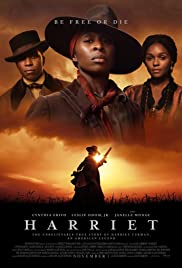

HARRIET
US, 2019, 125 minutes, Colour.
Cynthia Erivo, Leslie Odom Jr, Joe Allman, Clarke Peters, Henry Hunter Hall, Tim Guinee, Joseph Lee Anderson, Janelle Monae, Vondie Curtis- Hall.
Directed by Kasi Lemmons.
Perhaps the title does not strike a chord, not elicit memory. So, who is Harriet?
She is Harriet Tubman, one of the key African- American women in 19th century American history. To that extent, this film is a must for audiences throughout the United States. And it is important for non-Americans to experience something of the life of this woman, her courage, her causes, her commitment.
She is played by singer-actor, Cynthia Erivo (who made such an impression as the singer in Bad Times at El Royale and Widows), an Oscar-nominated performance (and something of a shock to discover that she was actually born in London).
Initially, Harriet was a young slave in a southern plantation, called Minty. The initial part of the film offers a portrait of life for the slaves on the plantation, their work, hardships, religious fervour, and the arrogant behaviour of the landowners, parent generation, younger generation.
Minty decides that she wants to escape and uses a great deal of ingenuity, local help and contacts, experiences of the dangers of pursuit, of the terrain, before she reaches the North, and finds a haven in the black community of Philadelphia. It is a new life for her and she chooses the name Harriet.
And that is only the beginning. A substantial section of the film involves Harriet, her return to the south, wanting to rescue her family members, setting up means for others to escape, accompanying them, succeeding, many escapees able to use the Underground Railroad. In fact, she gets such a reputation that she is feted in the media, condemned by the landowners in the South, out to capture her.
But, life is not easy. She is pursued,but continues her work, takes more public stances, challenges both black and white leaders in the North.
It is a wonder that we do not know more about her. Especially since she led an active group in an uprising during the Civil War. And, surprisingly, she did not die until 1913, a half-century after her participation in the war.
Well worth seeing, well written and acted, and a substantial reminder of the experiences of African- Americans in slavery and in freedom.
1. A piece of American history? Slavery? The history of slavery, in the American South? Issues of freedom? The underground railway? The Civil War? Legislation?
2. A portrait of Harriet Tubman in context, her life as a slave, growing up as a slave, dreams of escape, strong character, her own escape, life in Philadelphia, participation in the railway? Her own freeing of slaves? The Civil War?
3. The re-creation of the period, the plantations, the mansions, the fields, work in the fields? The countryside? The contrast with Philadelphia, in the early 19th century? Society? The boarding house? The dramatisation of the Civil War? The musical score, the Negro spirituals, the final song? Cynthia Erivo and her presence, performance, Oscar nomination, the final song?
4. The introduction to Minty? Her age, work, in the family house? The past with Gideon? Her marriage to John, his being a free man, the joy in getting the certificate, the hopes, the pastor’s rituals and his songs, the plantation owner tearing up the document? The mother and her place of the plantation? Gideon and his story, the past, the threats?
5. The importance of God in Harriet’s life, her career, language about God, the visions, being led? Changing her name to Harriet?
6. Her decision to escape, John and the possibilities, going to the Reverend, his advice, her not being able to read, listening to instructions, the country, her being pursued, the river, the decision to jump and to survive? Getting the contacts, going to visit them, further information, Philadelphia? Meeting with him Still, the welcome, Marie and her freedom, the boarding house, Harriet settling in, the bath? Bravery and determination?
7. The year passing, finding her place in society, the difficulties for escape, legislation Congress? The decision, to return, going south, the encounter with John, her love for him, the marriage, the news that she was dead, his marrying again? Her being distraught? Seeing her family? The decision for them to escape? The way, her leadership, the hesitation crossing the river, shown the way, God’s help, bringing them home? The acknowledgement of her work?
8. Her not being one to take advice, her going on various missions? The press reports and then naming her and her becoming Moses? Her success, the number of slaves escaping?
9. The posse being formed, the family and Gideon, the black tracker and Walter, wanting payments? Walter, associate, joining in, his watching Harriet, his change of heart, the line, his joining her help?
10. The railway, the people participating? The issue of getting to Canada?
11. The contrast with the family, the mother and her physical and mental collapse? Gideon’s life, the brothels? The owners gathering, rebelling against Moses? Accusing the family of causing the situation?
12. Harriet’s achievement, her success, her being inducted into the Society? That God gives her success? The underground railway? The leaders, the members, the initial meeting?
13. Her return, to get her parents, Walter and his help, the parents and their reaction, willing to go, the encounter with her sister? The dominance of the family over her sister? In the carriage, the driver and being mistaken for white? The carriage coming through? Gideon and the pursuit, the black man wanting to kill Harriet, shooting him? The confrontation between the two, the truth spoken, the rifle, Harriet not Gideon?
14. The Civil War, Harriet and her leadership, the rescue mission during the war?
15. Her death in 1913, 91 years, her place in American history, achievement?